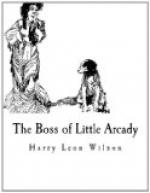“Soon,” said Potts, after the first drink, “ah, too soon, I shall be miles away from your thriving little hamlet,—as pretty a spot, by the way, as God ever made,—seeing none but strange faces, longing for the old hearty hand-clasps, seeking, perhaps, in vain, for one kindly look which—which is now to be observed on every hand. But, friends, Colonel J. Rodney will not forget you. I have rare prospects, but no matter. To this little spot, the fairest in all Nature,—here among your simple, heartfelt faces, where I first got my start,—here my feelings will ever and anon return; for—why should I conceal it?—it is you, my friends, who have made me the man I am.”
Here Potts put an arm over the shoulder of Big Joe and urged pleadingly: “Another verse of that sweet old song, boys. I tell you that has the true heart-stuff in it—now—”
They roared out a verse of “Auld Lang Syne,” with execrable attempts at part-singing, little Dan Lefferts, a dissolute house-painter, contributing a tenor that was simply maniacal.
Potts ordered more drinks. This done, he leaned heavily upon the bar and burst into tears. The varlets crowded about him with tender, soothing words, while we in the other room anxiously watched them and the clock.
He was overcome, it seemed, by the affection which it now transpired that Little Arcady bore for him. Presently he half dried his tears and drew from an inner pocket of his coat the package of our letters.
With eyes again streaming, in a sob-riven voice, he read them all to the pleased crowd. At the end, he regained control of himself.
“Gentlemen, believe it or not, nothing has touched me like this since I bade farewell to my regiment in ’65. You are getting under the heart of Jonas Rodney this time—I can’t deny that.”
He began on the letters again, selecting the choicest, and not forgetting at intervals to rebuke the bar-tender for alleged inactivity.
At last the clock marked ten-forty, and we heard the welcome rumble of the ’bus wheels. There was a hurried consultation with Amos Deane, the driver. He was to enter the bar in a brisk, businesslike way, seize the bag, and hustle the Colonel out before he had time to reflect. We peered over the screen, knowing the fateful moment was come.
We saw the Colonel resist the attack on his bag and listen with marked astonishment to the assertion of Amos that there was just time to catch the train.
“Time was made for slaves,” said Potts.
“That there train ain’t goin’ to wait a minute,” reminded Amos, civilly. The Colonel turned upon him with a large sweetness of manner.
“Ah, yes, my friend, but trains will be passing through your pretty little hamlet for years—I hope for ages—yet. They pass every day, but you can’t have Jonas Rodney Potts every day.”
Here, with a gesture, he directed the crowd’s attention to Amos.




